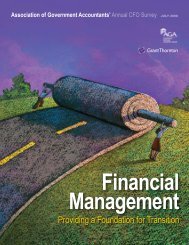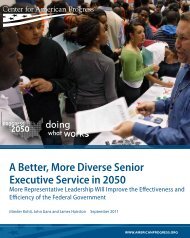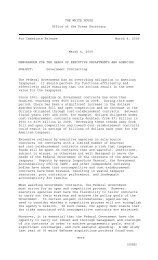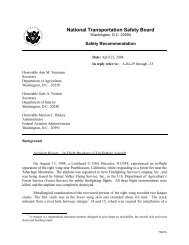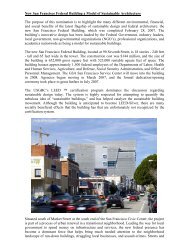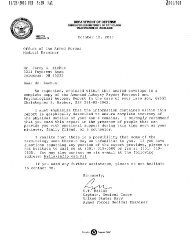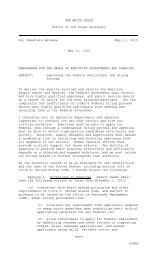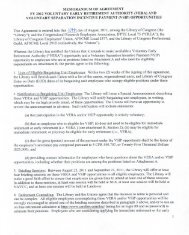Accenture's fifth annual global e-government study
Accenture's fifth annual global e-government study
Accenture's fifth annual global e-government study
Create successful ePaper yourself
Turn your PDF publications into a flip-book with our unique Google optimized e-Paper software.
The Deeds Office has recently issued a tender to the<br />
private sector (though not on a public-private partnership<br />
basis), for services that will digitize all of its<br />
existing deeds into an electronic document management<br />
system and introduce a process for digitizing<br />
all future deeds. Once this exercise is complete, the<br />
Deeds Office will have the necessary base to offer<br />
services to its customers online.<br />
The South African <strong>government</strong> also seems highly<br />
amenable to promoting eGovernment services<br />
for use by intermediaries, such as the post office<br />
network, the banking sector, community-based<br />
organizations and other private-sector organizations.<br />
In fact, the <strong>government</strong>’s stated intentions are to<br />
pursue such partnerships in all practicable situations.<br />
As the <strong>government</strong> works to build a more mature<br />
eGovernment program, it is concurrently working<br />
on promoting take-up through a number of means.<br />
Individual agencies are promoting their services with<br />
incentives. For example, the <strong>government</strong>’s revenue<br />
agency changed its business model for online filing<br />
to a free service and is also attracting users by<br />
extending the payment deadline and processing<br />
returns more quickly. The service saw an almost 10-<br />
fold growth in just five months, due primarily to these<br />
new incentives.<br />
Currently, eGovernment service adoption is hampered<br />
by the fact that very few South Africans have<br />
access to a computer. Internet penetration is currently<br />
less than 9 percent. The <strong>government</strong> is trying<br />
to bridge the digital divide through various initiatives,<br />
sometimes in conjunction with the private sector.<br />
For example, the Centre for Public Service Innovation<br />
is leading a project where the <strong>government</strong> portal is<br />
used by officials who act as intermediaries. Through<br />
“Multipurpose Community Centres,” multiple <strong>government</strong><br />
services are delivered in one location—in<br />
essence, providing one-stop service. Multipurpose<br />
Community Centres are defined as centers that have<br />
at least six <strong>government</strong> departments offering services<br />
to people who live nearby. They also typically<br />
have an information technology center for access<br />
to additional services such as those offered by non<strong>government</strong>al<br />
organizations and the business sector.<br />
Multipurpose Community Centres are viewed as the<br />
primary vehicle for implementing development communication<br />
and information programs, as they can<br />
serve as a base from which a wide range of services<br />
and products can reach communities.<br />
South Africa has also implemented the PiT project,<br />
which delivers access to services such as e-mail,<br />
e-business directory, <strong>government</strong> services and information,<br />
educational services and Internet browsing<br />
capabilities via kiosks, and which is seen as complementary<br />
to the Multipurpose Community Centres<br />
initiative.<br />
The City of Cape Town embarked on a Smart City<br />
strategy with the aim of empowering every citizen<br />
with technology-driven services. To enable this<br />
strategy, the city initiated a number of programs, of<br />
which the enterprise resource planning implementation<br />
program was one of the most significant. The<br />
City of Cape Town now seems well positioned for<br />
further initiatives to make the strategy a reality.<br />
In a move that may stimulate business use of<br />
eGovernment, the Independent Electoral Commission<br />
has implemented an Internet-based eProcurement<br />
solution, with which the commission is streamlining<br />
its procurement process and making the process fair<br />
and transparent. The system has both an Internet<br />
component (used by suppliers to register and bid<br />
on auctions) and an intranet component (used by<br />
the commission to maintain item specifications,<br />
manage auctions and approve suppliers). It has also<br />
been fully integrated with the Independent Electoral<br />
Commission’s existing enterprise resource planning<br />
and workflow management systems.<br />
With the significant usage of mobile technology in<br />
South Africa, many of the cellular service providers<br />
are working on services that can be provided via<br />
short messaging service and wireless access protocol.<br />
For example, the Independent Electoral Commission<br />
provides a service where voters can obtain voter<br />
registration information using a mobile phone.<br />
While South Africa showed little progress in 2003, it<br />
seems poised for marked improvement in 2004. The<br />
most critical aspect will be to get the eGovernment<br />
Gateway operational, as a starting point for delivering<br />
on its vision of citizen-centered service delivery.<br />
The <strong>government</strong>’s forays into wireless service are<br />
admirable and should be continued while additional<br />
alternatives are sought for at-home, fixed Internet<br />
eGovernment.<br />
97



